Marcos versus Sin: The battle of wits that led to EDSA
In May 1981 Manila Archbishop Jaime Cardinal Sin was recovering from his operation for hyper-plastic polyps at the Cardinal Santos Memorial Hospital when he got a call from President Ferdinand Marcos.
After asking how the Cardinal was doing, Marcos asked him if it was a mortal sin not to vote.
The presidential election was just a month away and eager to provide a constitutional fig leaf to his continued authoritarian rule, Marcos wanted the prelate to discourage the Catholic faithful from joining the snowballing movement to boycott the election.
“I kept my silence but he insisted that the Church should take a stand on the issue,” the Cardinal said.
Without the resources of force unlike the state, the Church, as embodied by Cardinal Sin, employed the spiritual resources of moral influence and sheer intelligence to outwit Marcos.
“I told him mortal sin is a grave offense that can bring you to hell. How can not voting be a mortal sin? He may have the prerogative to declare that it is—but one thing is legal, another is moral.”
The reply was quoted by Nick Joaquin in his 1992 biography, The Book of Sin (1992). It was vintage Sin: short and sweet, witty but withering.
The exchange too revealed the battle of wits between two brilliant men whose clashing personalities and ideals represent the two classic institutions of Church and State.
Without the resources of force unlike the state, the Church, as embodied by Cardinal Sin, employed the spiritual resources of moral influence and sheer intelligence to outwit Marcos.
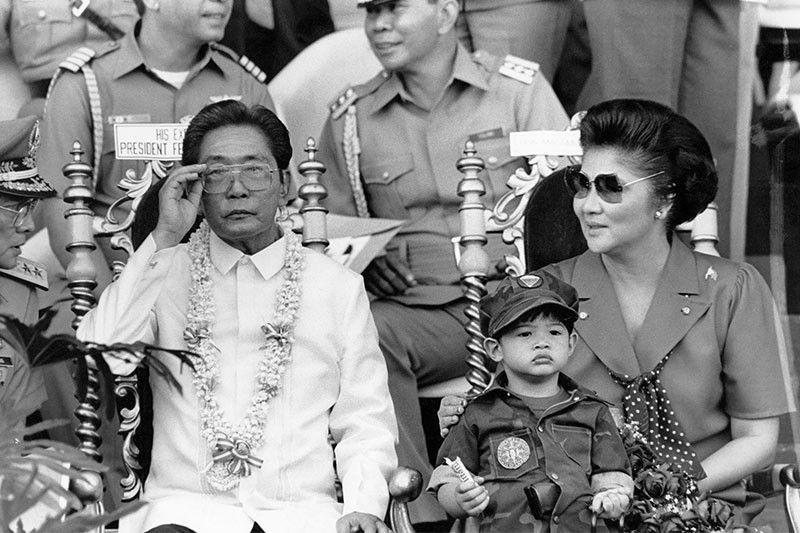
Earlier that year, on Jan. 17, 1981, Marcos had lifted martial law, exactly one month before the apostolic visit of Pope John Paul II. He did so after Cardinal Sin warned Marcos he would face civil war if he continued martial law.
But Sin wasn’t fully pleased; he felt the lifting was merely “cosmetic.”
The Cardinal had protested martial law since the military and the defense ministry could readily issue the dreaded ASSO—arrest, search, and seizure order—against any perceived dissenter or subversive.
ASSO was abolished along with martial law in 1981, but it was replaced by the PDA, “preventive detention action.” In short, critics of Marcos could still be arrested and detained even without a court order.
Cardinal Sin called PDA “unacceptable.”
The exteriors of a house may look new and beautiful, but what’s essential is what’s inside. If there are termites in there, the house will collapse.
The Church’s relations with the state during martial law and with Marcos were a matter of “critical collaboration,” as defined by the Catholic Bishops Conference of the Philippines (CBCP).
But some sectors teased Cardinal Sin that as far as his relations with Marcos were concerned, they were more “critical” than collaborative.
Cardinal Sin became the darling of the foreign media that called him “progressive.”
During the 1978 conclave that elected the Polish Cardinal Karol Wojtyla as Pope John Paul II, the foreign media took note of the Manila archbishop not only because he was the youngest elector but also because he tangled with the strongman Marcos.
Reported the British journalist Peter Hebblethwaite: “Sin was prepared to denounce the use of torture and arbitrary arrests, and protested to the President when a decree was passed which would have prevented the clergy from engaging in social work. The decree was withdrawn. Sin was clearly progressive.”
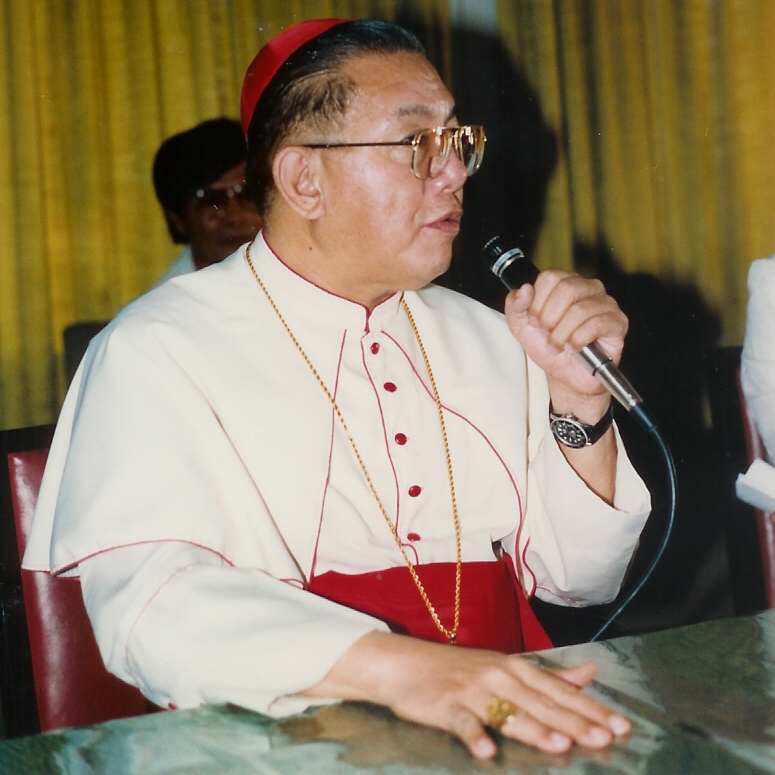
Cardinal Sin defended his activist stance toward the Marcos government.
“I have never been against anybody,” said Sin. “On the contrary, I have been rallying people behind the President so that we may achieve peace and unity. Of course these things won’t come easy, especially if they just continue painting the clouds with sunshine. The exteriors of a house may look new and beautiful, but what’s essential is what’s inside. If there are termites in there, the house will collapse.”
After the election, which Marcos supposedly won with an 88% majority, Cardinal Sin said all sectors should submit themselves “to the will of the people.”
But asked if Marcos had the people’s welfare at heart, the prelate replied, “I think so, yes—but he also likes to stay in power.”
“I have tried to be a constructive critic of government,” Sin added. “I do not hate him. He is brilliant and he has done so much—but he has to go!”
Join the parliament of the streets. Show the dictatorship that the power of non-violence can be irresistible.
The foreign media sent His Eminence’s soundbite across the globe: “Marcos Must Go, Says Sin!”
Marcos could let the remark slide because the foreign report would not appear in the Philippine media that his regime controlled completely. But it was a different matter altogether when Benigno Aquino Jr. was assassinated on August 21, 1981.
There was widespread outpouring of grief and rage. Cardinal Sin embodied that grief and rage when he delivered the funeral oration for the fallen senator at Santo Domingo Church:
“Posed is a challenge to the State to bring about reconciliation through the restoration of all those freedoms the people have lost, the freedoms whose denial has reduced the Filipino to being an exile in his own country…
“Will the State give heed to the cry of the people? … Our people are waiting for a reply. They wait, no longer as timid and scattered sheep, but as men and women purified and strengthened by the profound communal grief that has made them one.”
When Marcos invited Sin to join the commission that he had formed to investigate the assassination, the latter refused. The refusal prefigured the fate of the commission headed by Chief Justice Enrique Fernando. It conducted several hearings and ocular inspections before all five members resigned due to widespread criticism it was not impartial because of Fernando’s alleged closeness to Marcos.
Cardinal Sin came up with a pastoral advice that floored his own theologians: 'I told the people: If they offer you money—take it—but vote according to your conscience! Take it. Use it for your family. But you are not bound by an evil contract.'
A year later, Cardinal Sin pressed the matter further. “Join the parliament of the streets,” he urged Filipinos in the Mass marking the first death anniversary of Aquino. “Show the dictatorship that the power of non-violence can be irresistible.”
Informed that Marcos was fuming over his remarks in a televised address, Sin shrugged off the report. “If Mr. Marcos believes I have committed sedition, why doesn’t he arrest me?”
Things came to a head in the snap presidential election of 1986. Countering the alleged vote-buying employed by the Marcos election campaign juggernaut, Cardinal Sin came up with a pastoral advice that floored his own theologians: “I told the people: ‘If they offer you money—take it—but vote according to your conscience!”
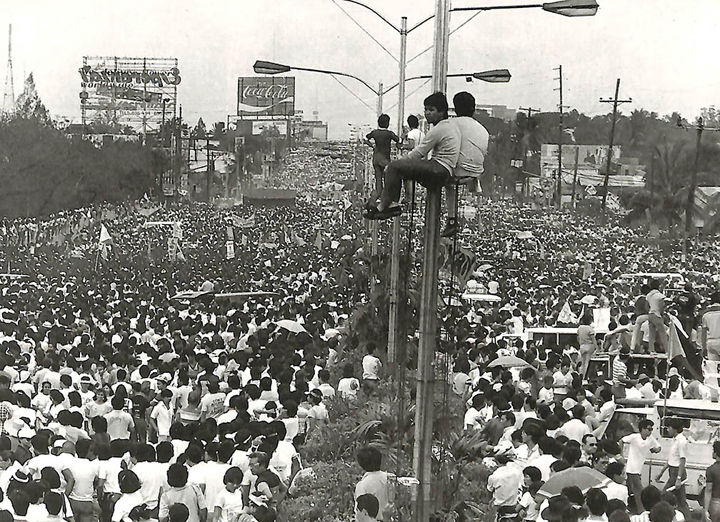
“The Marcos regime was very angry at that,” Sin recounted later. “They thought I was teaching the people to steal their money.”
“But I was not teaching people to steal,” the prelate explained. “This money really belonged to them. It was stolen from the people in the first place. The poor man in the squatter shack whose children are hungry, whose wife is sick—you cannot ask him to refuse five pesos. He needs it, to survive. So I said: ‘Take it. Use it for your family. But you are not bound by an evil contract. Vote according to your heart.’”
In the canvassing of votes at the count center of the Commission on Elections at the Philippine International Convention Center, the tally showed Marcos winning which contrasted with the tally of the independent electoral watchdog National Movement for Free Elections (Namfrel).
Thirty Comelec computer experts later walked out in protest. The Cardinal called the incident “heaven-inspired”—“because what they were putting in their computers were not coming out on the tally boards!”
He sought them out, noting that they were mostly women; he blessed them and shielded them from retaliation by Marcos by giving them a safehouse.
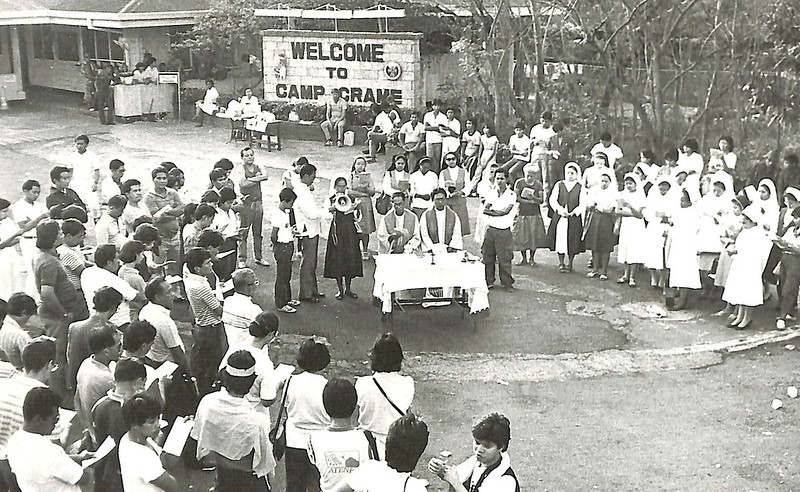
Civilian support grew undeniably in Camp Crame on a Sunday, as some rebel soldiers supporting Enrile and Ramos stayed within the camp premises Edgardo Clemente, People Power: The Philippine Revolution of 1986 via Presidential Museum and Library
Marcos responded by accusing Namfrel of election fraud, showing footage taken by government media of nuns and Namfrel watchdogs purportedly stealing ballot boxes—boxes they were actually guarding.
Cardinal Sin countered what should now be called as “fake news” by going to the Namfrel’s Operation Quick Count Center. According to journalist Bryan Johnson:
“Cardinal Sin was not about to absorb such barbs in silence, and now he was declaring war, here in the Operation Quick Count Center, in a gesture that seemed to bless every man, woman, child and computer terminal in the room. ‘I know the truth about you,’ shouted the Cardinal. ‘I know you are doing your best to restore the freedom and dignity of the Filipino people.’”
Along with his four auxiliary bishops, the Manila prelate later issued a pastoral letter that declared the elections “a fraud.” The letter said the Marcos regime had “no moral basis” for its existence and the people should express their will by “enforcing it” but that this must be done “without violence.”
I hope we can achieve change without destroying ourselves.
The CBCP on February 17 came out with its own statement that completely agreed with the Manila Archdiocese’s.
“If such a government does not of itself freely correct the evil it has inflicted on the people then it is our serious moral obligation as a people to make it do so,” the CBCP said. “The way indicated to us now is the way of nonviolent struggle for justice.”
On February 22, the struggle came to a head when Cardinal Sin went on Radio Veritas to urge Filipinos to go to Camp Aguinaldo where defense secretary Juan Ponce Enrile and Armed Forces of the Philippines vice chief of staff Fidel V. Ramos had holed themselves up.
“Enrile and Ramos are besieged,” he announced on radio. “Tanks and soldiers are moving in on them. Please go out to the streets and surround Camp Crame, surround Camp Aguinaldo. Get between the tanks and our friends in Crame and Aguinaldo."
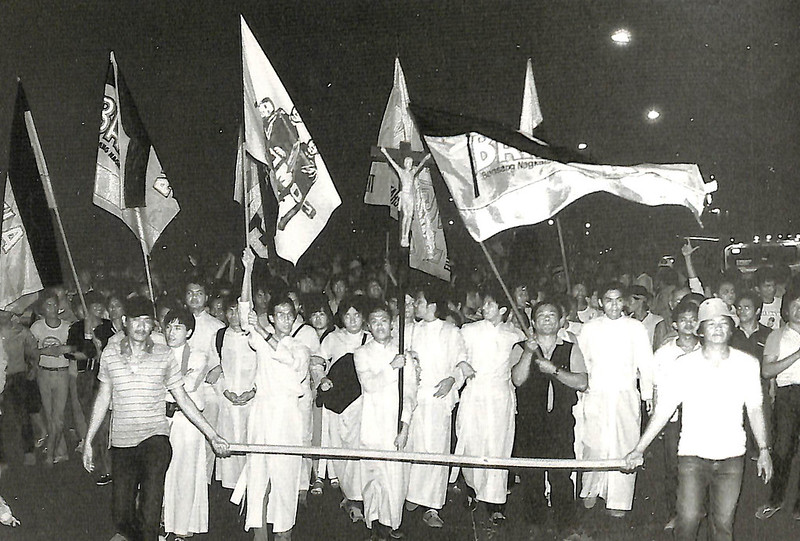
“I am sorry to disturb you at this late hour-but we need your support."
“Leave your homes now! Go to EDSA! Our good friends there have shown their idealism. Keep them safe.”
Instantly people massed up between the two camps on EDSA. More people came the following day, a Sunday, stopping traffic at the whole stretch of the road. By Monday the whole country, indeed the whole world, was at a standstill.
On February 25, Malacanang pushed through with the inauguration of Marcos. But it was all false bravado. Marcos and his family fled the country on the same day.
Cardinal Sin was able to gain the upper hand in his battle of wits with Marcos. He was able to achieve a revolution non-violently.
In hindsight, Cardinal Sin in 1981 was painting the colors of the Edsa Revolution when he criticized Marcos for perpetuating himself in office.
“I hope we can achieve change without destroying ourselves,” he had said. “Revolution would be the greatest evil that could happen to our country. Marcos can simply get a plane and fly out. It’s those left behind the poor especially, who will suffer.”


